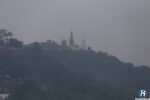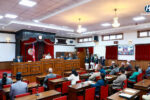Tehran: A new Iranian general has stepped out of the shadows to lead the country’s expeditionary Quds Force, becoming responsible for Tehran’s proxies across the Mideast as the Islamic republic threatens the US with “harsh revenge” for killing its previous head, Qassem Soleimani.
The Quds Force is part of the 125,000-strong Revolutionary Guard, a paramilitary organization that answers only to Iran’s Supreme Leader Ayatollah Ali Khamenei.
The Guard oversees Iran’s ballistic missile program, has its naval forces shadow the US Navy in the Arabian Gulf and includes an all-volunteer Basij force.
Like his predecessor, a young Esmail Ghaani faced the carnage of Iran’s eight-year war with Iraq in the 1980s and later joined the newly founded Quds, or Jerusalem, Force.
While much still remains unknown about Ghaani, 62, Western sanctions suggest he’s long been in a position of power in the organization.
And likely one of his first duties will be to oversee whatever revenge Iran intends to seek for the US airstrike early Friday that killed his longtime friend Soleimani.
“We are children of war,” Ghaani once said of his relationship with Soleimani, according to Iran’s state-run IRNA news agency.
“We are comrades on the battlefield and we have become friends in battle.”
The Guard has seen its influence grow ever-stronger both militarily and politically in recent decades.
A key driver of that influence comes from the elite Quds Force, which works across the region with allied groups to offer an asymmetrical threat to counter the advanced weaponry wielded by the US and its regional allies. Those partners include Iraqi militiamen, Lebanon’s Hezbollah and Yemen’s Houthi rebels.
In announcing Ghaani as Soleimani’s replacement, Ayatollah Ali Khamenei called the new leader “one of the most prominent commanders” in service to Iran.
The Quds Force “will be unchanged from the time of his predecessor,” Khamenei said, according to IRNA.
Soleimani long has been the face of the Quds Force. His fame surged after American officials began blaming him for deadly roadside bombs targeting US troops in Iraq.
Images of him, long a feature of hard-line Instagram accounts and mobile phone lockscreens, now plaster billboards calling for Iran to avenge his death.
But while Soleimani’s exploits in Iraq and Syria launched a thousand analyses, Ghaani has remained much more in the shadows of the organization.
He has only occasionally come up in the Western or even Iranian media. But his personal story broadly mirrors that of Soleimani.
Born on Aug. 8, 1957 in the northeastern Iranian city of Mashhad, Ghaani grew up during the last decade of monarchy.
He joined the Guard a year after the 1979 revolution. Like Soleimani, he first deployed to put down the Kurdish uprising in Iran that followed the shah’s downfall.
Iraq then invaded Iran, launching an eight-year war that would see 1 million people killed.
Many of the dead were lightly armed members of the Guard, some of whom were young boys killed in human-wave assaults on Iraqi positions.
Volunteers “were seeing that all of them are being killed, but when we ordered them to go, would not hesitate,” Ghaani later recounted.
“The commander is looking to his soldiers as his children, and in the soldier’s point of view, it seems that he received an order from God and he must to do that.”
He survived the war to join the Quds Force shortly after its creation. He worked with Soleimani, as well as led counterintelligence efforts at the Guard.
Now, Ghaani is firmly in control of the Quds Force. While Iran’s leaders say they have a plan to avenge Soleimani’s death, no plan has been announced as the country prepares for funerals for the general starting Sunday.
Whatever that plan for revenge is, Ghaani likely will be involved.
“That Qaani survived at such high ranks in the (Guard), and remained Soleimani’s deputy for so long, says a lot about the trust both Khamenei and Soleimani had in him,” said Afshon Ostovar, the author of a book on the Guard. “I suspect he’ll have little difficulty filling Soleimani’s shoes when it comes to operations and strategy.”
(Agencies)









Comment